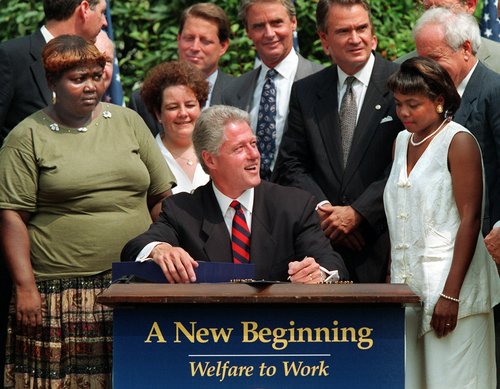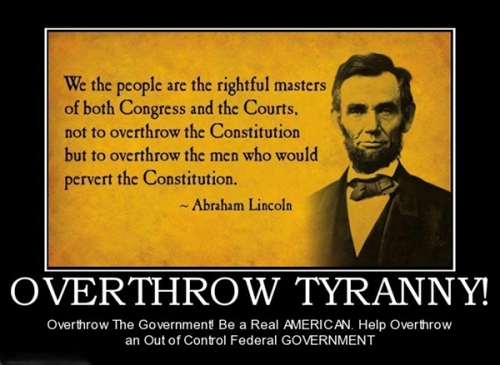 Of the 2.2 million people incarcerated in the United States, about half are parents, and at least 1 in 5 has a child-support obligation. For most, the debt will keep piling up throughout their imprisonment: By law or by practice, child-support agencies in much of the country consider incarceration a form of “voluntary impoverishment.” Parents like Harris, the logic goes, have only themselves to blame for not earning a living. But that may be about to change.
Of the 2.2 million people incarcerated in the United States, about half are parents, and at least 1 in 5 has a child-support obligation. For most, the debt will keep piling up throughout their imprisonment: By law or by practice, child-support agencies in much of the country consider incarceration a form of “voluntary impoverishment.” Parents like Harris, the logic goes, have only themselves to blame for not earning a living. But that may be about to change.

What does this tell you about overdue child support?
Republicans opposed to new regulations
The Obama administration has authorized a new set of regulations that would reclassify incarceration as “involuntary,” giving parents the right to push the pause button on child-support payments. The regulations are set to be published early next year and implemented by states by 2017.
Congressional Republicans oppose the new policy. They argue that it would undercut the 1996 welfare reform act, which pressed states to locate missing fathers and bill them for child support so taxpayers wouldn’t bear the full burden of their children’s welfare. (What idiots, the debt can’t be paid anyway.)
“I am fundamentally opposed to policies that allow parents to abdicate their responsibilities, which, in turn, results in more families having to go on welfare,” Senate Finance Committee Chairman Orrin Hatch, R-Utah, said in a speech in June on the Senate floor. Obama’s new regulations, he said, “would undermine a key feature of welfare reform, which is that single mothers can avoid welfare if fathers comply with child-support orders.”
Frances Pardus-Abbadessa, head of child-support enforcement for New York City, said: “The complaint we often hear is, ‘Why should incarcerated fathers, of all people, be the ones to get a break from their obligations — and at a cost to the taxpayer?’ “
Administration officials and their supporters counter that billing fathers while they’re in prison does little but dig them deeper into debt.
“Billing poor fathers doesn’t help poor mothers and kids become less poor,” said Jacquelyn Boggess, a poverty expert with the Center for Family Policy and Practice.
“All it creates,” she said, “is a highly indebted individual.”
Debt piles up
For Earl Harris, the problem was keeping up. He had a job in prison, cleaning the kitchen, but it paid only $7.50 a month — well short of the $168 the state of Missouri was billing him.
“Didn’t they know I was in prison?” he asks. “Weren’t they the ones that put me in there?”
When he got out in 2001, the unpaid amount was listed on his credit report — and pursued by an agency with the power to garnish 65 percent of his wages, intercept his tax returns, freeze his bank account, suspend his driver’s license and, if he failed to pay, lock him up again. By then, his debt had surged to more than $10,000.
Harris entered barbering school but soon returned to drug dealing and was thrown back into prison for nearly a decade. Meanwhile, his child-support debt swelled to more than $25,000.
Incarceration currently deemed ‘voluntary’
Harris’s plight is not unusual. The Marshall Project interviewed nearly three dozen noncustodial parents in 10 states; they all left prison owing between $10,000 and $110,000 in child support. Mostly fathers who are disproportionately black and poor, these parents faced prosecution for not repaying the debt, even after their children were grown.
And what they were able to pay did not necessarily go to their children or the mother. The state often kept their money as repayment for welfare, child care or Medicaid benefits that had been provided to the family while the dad was locked up.
To address the issue, the Obama administration began drafting new rules about four years ago. As currently written, the rules would forbid state child-support agencies from classifying incarceration as “voluntary,” granting parents the legal right to a reduction in payments while they’re in prison, a right that does not exist in 14 states.
The rules would require agencies to inform incarcerated parents of this right and would encourage agencies to provide a reduction in payments automatically. And they would urge states to transfer all payments directly to custodial parents — mostly mothers — and their children.
The administration proposal would provide about $35 million over the next five years to modernize the child-support system and to provide job training, job placement, bus fare, and other services to fathers facing prosecution for nonpayment.
The rule “will make sure that arrears don’t accumulate endlessly while a parent is incarcerated,” said Vicki Turetsky, President Barack Obama’s commissioner of child-support enforcement. “Our goal is to collect, month by month, for kids. We can do that when parents are employed, not in debt.”
Hatch and House Ways and Means Committee Chairman Paul Ryan, R-Wis., have introduced legislation to block the new rules, though neither lawmaker has pushed to advance the measure.
Ron Haskins, a child-support expert at the Brookings Institution, said he and other conservatives actually support parts of the new regulations. But they worry, he said, that the policy “could begin a long process of undermining the child-support concept, which they strongly believe in.”
The struggle after prison
Back in North St. Louis, Earl Harris, now 38, has put in his hours as an apprentice barber and is one written test away from getting his license. In the meantime, he is living in a halfway house and working at a factory across the river in Illinois, packaging Febreze canisters and Swiffer mops.
His hours are 4 p.m. to midnight, though he arrives an hour early to make sure he doesn’t lose his spot to another temp worker waiting outside the building in hopes of getting a shift. After work, he typically gets a cousin to drive him back to his dorm room, where he sleeps from 2 a.m. to 6 a.m. before heading to his daily support group for fathers.
By 8 a.m. the dads are circled up, talking about having kids and debt. They have come because the program helps them find a job, develop strategies for handling their arrears and work on their parenting skills. They also get free legal help. Many of them were incarcerated, almost exclusively for selling drugs, and everyone is wearing a jacket and tie, the uniform of employment.
One father, Louis Moore, said his debt soared to almost $60,000 while he was inside. Allan Newcomer’s is more than $68,000. “Everybody in the penitentiaries was getting the letters,” Newcomer said.
Lisl Williams, a former judge who now works with the fathers, said even if they spend their money on food, clothes or toys for their children, it does not reduce their debt. In many cases, she said, the whole family — the mother, aunts, uncles, cousins — chips in to help pay it, and then the money they pay goes to the government as repayment for welfare they received long ago.
Because the fathers don’t have large incomes to garnish, bank accounts to tap or property to seize, she adds, they are more likely to face re-incarceration for not paying their arrears.
‘I know I’m the bad man’ (Oh, really?)
Another dad, Corey Mason, said he was incarcerated and already racking up child-support debt when he got a notice saying he might have another child by a different mother. He was instructed to go to the medical wing, get a DNA swab and send it to the agency. When they confirmed his paternity, he started getting a new set of child-support bills.
Mason sent several handwritten letters to the agency explaining that he was in prison. He said he never got a response. (So who is really bad? You know!)
Now that he’s out, Mason has a job at the Marriott hotel downtown. He works the graveyard shift, cleaning, shutting down the bar, providing towels to customers who ask for extra. Because the child-support agency garnishes well over half his weekly paycheck, he turned down a recent promotion.
“I want to grow in the company. But I don’t want to work that much harder if they’re just going to take all of it to pay for history,” Mason said.
“I know I’m the bad man. But I’m working harder now than I ever have, and it’s like this is designed to keep me behind, backed up against the wall, in debt for the rest of my life.” (Hear the defeat and fear? That’s what they want!)
Obama: ‘Too many fathers M.I.A, AWOL’
Obama has frequently scolded the same absentee fathers who now stand to benefit from his regulations. “Too many fathers are M.I.A., too many fathers are AWOL, missing from too many lives and too many homes,” he told a Chicago audience in 2008 as a candidate for president.
Some fathers interviewed for this story had multiple children — one man said he had 12 — by different mothers. Many seemed less than eager to find employment. A few served time for domestic violence.
Some mothers say these men do not deserve to be freed of their debt.
“There’s a real tension here, as a matter of public policy,” said Joan Entmacher, an expert on family poverty at the National Women’s Law Center. “There are absolutely fathers who evade their responsibilities, saying, ‘Oh, I can’t pay that,’ and not even trying. We don’t want to simply reward that attitude.”
Even if a father is a deadbeat, however, the evidence is clear: Noncustodial fathers are far more likely to pay child support, and otherwise reengage with their families, if payments are manageable.
In a 2012 study by the Center for Policy Research, a private nonprofit research organization, fathers paid a much higher percentage of their monthly obligations when offered relief from unpayable state-owed debt. In studies in Maryland, Illinois and California, fewer than 15 percent remained noncompliant once the old debts were reduced and they were given a schedule of regular payments. And the fathers most likely to abide by “debt compromise” agreements were those who had been incarcerated.
Boggess, the child-support analyst, said that trying to collect the accumulated debt is “like squeezing an empty bottle and hoping something comes out.
“These fathers are poor, period. Their arrears are uncollectible, period,” she said. “They’ve never even met anyone who had $30,000.”
States taking action
Many states have already taken action. In 36 states and the District, incarceration is no longer officially considered “voluntary” impoverishment, and an imprisoned father is legally entitled to have his monthly child-support bill modified to as little as $50 a month or, in rare cases, stopped altogether.
But it is still up to the father to prove he is incarcerated, and then to file for the reduction. This involves navigating a maze of paperwork from prison, usually with no lawyer, irregular access to phones and, in many cases, an eighth- or ninth-grade education.
The most common pitfall, said Bo Twiggs, the director of UpNext, a program in New York City that helps recently incarcerated fathers, is that the incarcerated dad has no idea his child support is piling up because he isn’t getting the notices. The debt keeps compounding – and federal law prohibits the reduction of child-support bills retroactively.
“It’s hard for these fathers to understand that they can’t wait, they can’t adjust to life in prison before dealing with child support, that they need to take action immediately because the debt will be permanent,” Twiggs said. “That’s really counterintuitive.”
When these fathers get out of prison, they often don’t notice the debt until the state begins pursuing it, “which forces them to go underground instead of rejoining the formal economy,” said Turetsky, Obama’s commissioner of child-support enforcement.
Indeed, research shows that the two most important factors in a former prisoner’s successful reentry into the community are employment and positive relationships with family. Both of these are hindered by the aggressive pursuit of child-support arrears: Garnishing 65 percent of a father’s paycheck, so he is tempted to earn cash off the books; suspending his driver’s license so he can’t get to work; sending him bills that are so far beyond his capacity to pay that he keeps his distance from his family.
“I see it all the time,” Twiggs said: “Not reengaging with the family. Noncompliance with parole and child support. Under-the-table efforts at income. Self-defeat, high anxiety, general institutional distrust. All of that is triggered by this absolutely overwhelming, impossible feeling of debt.”
portions from the Atlanta Journal-Constitution
 The typical divorce is actually pretty painful. The standard DEAL is almost an assault to fatherhood, and we need to fight to change it. In the most common arrangement, Mom gets the kids and house, dad gets the child support payment. It’s how things used to work. But today, unfortunately, the courts still go by this structure unless there is significant fight to something difference.
The typical divorce is actually pretty painful. The standard DEAL is almost an assault to fatherhood, and we need to fight to change it. In the most common arrangement, Mom gets the kids and house, dad gets the child support payment. It’s how things used to work. But today, unfortunately, the courts still go by this structure unless there is significant fight to something difference. The non-custodial parent is assumed to be a deadbeat when they are calling the AG’s office. You are segmented into custodial or non-custodial parent at the beginning. If you are the non-custodial parent the only reason you’d be calling is you are behind on your child support.
The non-custodial parent is assumed to be a deadbeat when they are calling the AG’s office. You are segmented into custodial or non-custodial parent at the beginning. If you are the non-custodial parent the only reason you’d be calling is you are behind on your child support. So let’s see, I’ve got no home. I’m paying $1,200 a month for child support and $1,200 a month for health care. How can I afford an apartment? If I don’t have a killer job ($2,400 after tax expenses before I get a dollar for myself or my survival. Well, that’s a pretty steep hill to climb.
So let’s see, I’ve got no home. I’m paying $1,200 a month for child support and $1,200 a month for health care. How can I afford an apartment? If I don’t have a killer job ($2,400 after tax expenses before I get a dollar for myself or my survival. Well, that’s a pretty steep hill to climb. This leaves a lot of dads as deadbeats, not because they are actually trying to shirk their responsibility, but because the mom and the court have saddled them up with so much financial liability that they cannot afford to make the payments each month. At that point the dad is subject to financial liens, foreclosure, and checking account freezes.
This leaves a lot of dads as deadbeats, not because they are actually trying to shirk their responsibility, but because the mom and the court have saddled them up with so much financial liability that they cannot afford to make the payments each month. At that point the dad is subject to financial liens, foreclosure, and checking account freezes. Fair treatment of fathers begins at the beginning of the relationship. BEFORE you have kids, you can agree to parent 50/50. If that’s the deal, you should have the discussion about if things don’t work out. (I’m not talking prenuptial, just an understanding) In my marriage we started out 50/50, but as soon as she decided she wanted a divorce (yes, it was her idea) the arrangement went to the cutting floor and I was handed the dad deal. A bad deal for everyone.
Fair treatment of fathers begins at the beginning of the relationship. BEFORE you have kids, you can agree to parent 50/50. If that’s the deal, you should have the discussion about if things don’t work out. (I’m not talking prenuptial, just an understanding) In my marriage we started out 50/50, but as soon as she decided she wanted a divorce (yes, it was her idea) the arrangement went to the cutting floor and I was handed the dad deal. A bad deal for everyone. The money after divorce should be divided equally. Anything else puts man men at risk for debit issues, credit issues, and put them at risk of suicide and depression. Let’s put the balance back in divorce. Give both parents the benefit of the doubt. And both parents should be advocating for a 50/50 split in the same spirit they entered parenthood, with expectations of a 50/50 partnership. That partnership doesn’t end at divorce. But if we load up the man with all of the financial obligations and punish him for being late on a payment or two, we are hurting all the members of the family. The mom loses when the dad’s account is frozen. Even if the mom didn’t want it to happen. Once you’ve asked the AG’s office into your divorce, they never leave. (Inviting the Dinosaur Into Your Divorce)
The money after divorce should be divided equally. Anything else puts man men at risk for debit issues, credit issues, and put them at risk of suicide and depression. Let’s put the balance back in divorce. Give both parents the benefit of the doubt. And both parents should be advocating for a 50/50 split in the same spirit they entered parenthood, with expectations of a 50/50 partnership. That partnership doesn’t end at divorce. But if we load up the man with all of the financial obligations and punish him for being late on a payment or two, we are hurting all the members of the family. The mom loses when the dad’s account is frozen. Even if the mom didn’t want it to happen. Once you’ve asked the AG’s office into your divorce, they never leave. (Inviting the Dinosaur Into Your Divorce) A law suit challenging New Jersey’s automatic suspension of driver’s licenses for child support arrears says that the Division of Family Development misled lawmakers to convince them that the program is a success.
A law suit challenging New Jersey’s automatic suspension of driver’s licenses for child support arrears says that the Division of Family Development misled lawmakers to convince them that the program is a success. Many states have opted for oppression when it comes down to child support debt. A few wiser minds are prevailing in a few places. When the state of Maryland wanted to reach dads who were behind on their child support payments, it started in the boarded-up blocks of West Baltimore, in neighborhoods marked by drugs, violence and unemployment.
Many states have opted for oppression when it comes down to child support debt. A few wiser minds are prevailing in a few places. When the state of Maryland wanted to reach dads who were behind on their child support payments, it started in the boarded-up blocks of West Baltimore, in neighborhoods marked by drugs, violence and unemployment. “So even if we use taxpayer dollars to chase ’em down, and we catch ’em, right, and we go into their pockets, there’s nothing in there,” says Joe Jones of Baltimore’s Center for Urban Families.
“So even if we use taxpayer dollars to chase ’em down, and we catch ’em, right, and we go into their pockets, there’s nothing in there,” says Joe Jones of Baltimore’s Center for Urban Families. Like a growing number of state government officials, Maryland’s DiPrimio wanted to make parents an offer. But he needed their trust, and that was a problem.
Like a growing number of state government officials, Maryland’s DiPrimio wanted to make parents an offer. But he needed their trust, and that was a problem. To break through years of distrust, Maryland sent letters to parents with the logo of the Center for Urban Families, a nonprofit in West Baltimore that provides job training and other help to poor families.
To break through years of distrust, Maryland sent letters to parents with the logo of the Center for Urban Families, a nonprofit in West Baltimore that provides job training and other help to poor families. Response has been slow. In two years, slightly more than 100 parents have signed on. Many of them attend fatherhood meetings like one held on a recent Wednesday night. Two dozen men — 20-something to middle age, in sweats and in suits — sit in a large square.
Response has been slow. In two years, slightly more than 100 parents have signed on. Many of them attend fatherhood meetings like one held on a recent Wednesday night. Two dozen men — 20-something to middle age, in sweats and in suits — sit in a large square. The Obama administration wants to “right size” child support orders from the start, and has proposed regulations to make sure they are set according to what parents actually earn. Officials say some jurisdictions base orders on a full-time minimum wage, even if a parent earns far less. They say this can backfire, leaving so little money after a parent’s wages are garnished that he or she quits and works underground instead.
The Obama administration wants to “right size” child support orders from the start, and has proposed regulations to make sure they are set according to what parents actually earn. Officials say some jurisdictions base orders on a full-time minimum wage, even if a parent earns far less. They say this can backfire, leaving so little money after a parent’s wages are garnished that he or she quits and works underground instead.

 Of the 2.2 million people incarcerated in the United States, about half are parents, and at least 1 in 5 has a child-support obligation. For most, the debt will keep piling up throughout their imprisonment: By law or by practice, child-support agencies in much of the country consider incarceration a form of “voluntary impoverishment.” Parents like Harris, the logic goes, have only themselves to blame for not earning a living. But that may be about to change.
Of the 2.2 million people incarcerated in the United States, about half are parents, and at least 1 in 5 has a child-support obligation. For most, the debt will keep piling up throughout their imprisonment: By law or by practice, child-support agencies in much of the country consider incarceration a form of “voluntary impoverishment.” Parents like Harris, the logic goes, have only themselves to blame for not earning a living. But that may be about to change.
 The public views court-ordered formulas calculating child support in the United States and England to be unfair, according to a study released Monday. Articles proclaim that researchers hope that this will be valuable information for policymakers dealing with family law issues. Existing child support law is not consistent with the basic application of fairness that most people have.
The public views court-ordered formulas calculating child support in the United States and England to be unfair, according to a study released Monday. Articles proclaim that researchers hope that this will be valuable information for policymakers dealing with family law issues. Existing child support law is not consistent with the basic application of fairness that most people have. This study used face-to-face questions and feelings about certain courtroom scenarios. Respondents were found to be three times as responsive than the law when it came to adjusting child support based on income changes of the noncustodial parent. In one hypothetical scenario, if the noncustodial parent made less than a custodial parent, the amount of child support would be lowered, by $100. In that case, the respondents reported they would actually lower the amount by $300. Judges have grown to be jaded and unfair.
This study used face-to-face questions and feelings about certain courtroom scenarios. Respondents were found to be three times as responsive than the law when it came to adjusting child support based on income changes of the noncustodial parent. In one hypothetical scenario, if the noncustodial parent made less than a custodial parent, the amount of child support would be lowered, by $100. In that case, the respondents reported they would actually lower the amount by $300. Judges have grown to be jaded and unfair. Child support is routinely established at levels higher than the noncustodial parent can pay. Child support is determined by judges who refer to an income table and set of guidelines. Judges do have the authority to depart from those guidelines and modify amounts depending on certain circumstances, but they must justify in writing why a case needs different treatment. This may, or may not be a problem. Yet, the difficulty of modifying court-ordered child support in situations where non-custodial parents have lost their job or had a pay cut is another shortcoming of the current system. Fear is designed to be the continued motivation for the non-custodial parent.
Child support is routinely established at levels higher than the noncustodial parent can pay. Child support is determined by judges who refer to an income table and set of guidelines. Judges do have the authority to depart from those guidelines and modify amounts depending on certain circumstances, but they must justify in writing why a case needs different treatment. This may, or may not be a problem. Yet, the difficulty of modifying court-ordered child support in situations where non-custodial parents have lost their job or had a pay cut is another shortcoming of the current system. Fear is designed to be the continued motivation for the non-custodial parent. In 2013, a
In 2013, a  In the end, Hall
In the end, Hall 
 After losing his $15-an-hour job fueling airliners in Minneapolis, the Somali-American father of nine survived on low-wage jobs and public assistance. He complained about working hard, but never having enough money. His circumstances worsened when he was ordered to pay more than $700 a month to support three of his children — including one less than a year old.
After losing his $15-an-hour job fueling airliners in Minneapolis, the Somali-American father of nine survived on low-wage jobs and public assistance. He complained about working hard, but never having enough money. His circumstances worsened when he was ordered to pay more than $700 a month to support three of his children — including one less than a year old. “A muslim has to stand up for was right. … I give up this worldly life for allah and to save the ummah (community of believers) if that makes terrorist am happy with it,” he wrote in a Jan. 3, 2014 post.
“A muslim has to stand up for was right. … I give up this worldly life for allah and to save the ummah (community of believers) if that makes terrorist am happy with it,” he wrote in a Jan. 3, 2014 post. The next month, a member of Ahmed’s family received a picture that appeared to show him dead, with a gunshot wound to the head. The State Department is working to verify reports of Ahmed’s death, but Hussein identified the person in the photo as his friend, who would have been 34 according to court records.
The next month, a member of Ahmed’s family received a picture that appeared to show him dead, with a gunshot wound to the head. The State Department is working to verify reports of Ahmed’s death, but Hussein identified the person in the photo as his friend, who would have been 34 according to court records.